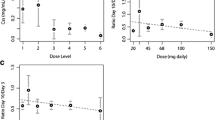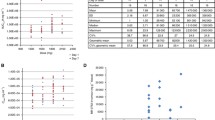Summary
Purpose The notch pathway is overexpressed in pancreatic adenocarcinoma. RO4929097, an oral inhibitor of the γ-secretase enzyme has been safely given as a single agent in patients with advanced solid tumors. We aimed to evaluate the efficacy of RO4929097 in patients with pancreatic adenocarcinoma (PDA). Methods A two-stage, single-arm Phase II trial was conducted in patients with previously treated metastatic PDA. RO4929097 was administered at a dose of 20 mg daily on days 1–3, 8–10 and 15–17 of 21-day cycles. The primary endpoint was survival at 6 months. Secondary endpoints included overall survival (OS), response rate, toxicities, pharmacokinetic and pharmacodynamic analyses. Results Eighteen patients were recruited, 17 in the first stage and one in the 2nd stage. It was decided to stop further enrollment after RO4929097 was discontinued by the sponsor and was no longer a development candidate. Three (25 %) of 12 evaluable patients achieved stable disease. The 6-month survival rate was 27.8 % (95 % CI 9.7–53.5). The median OS was 4.1 months (95 % CI 2.7–5.8 months) and median progression-free survival was 1.5 months (95 % CI 1.3–1.6 months). Pharmacokinetic properties of RO4929097 in patients (n = 5) with PDA was similar to that previously reported in other patient populations. There was a trend towards a decrease in HeyL (p = 0.08) gene expression in three patients following study drug administration. Conclusions RO4929097 was well-tolerated in patients with previously treated PDA. Development of RO4929097 has been discontinued, but development of other notch-targeting agents in pancreatic cancer is continuing.

Similar content being viewed by others
References
Conroy T, Desseigne F, Ychou M, Bouche O, Guimbaud R, Becouarn Y, Adenis A, Raoul JL, Gourgou-Bourgade S, de la Fouchardiere C et al (2011) FOLFIRINOX versus gemcitabine for metastatic pancreatic cancer. N Engl J Med 364(19):1817–1825
Von Hoff DD, Ervin T, Arena FP, Chiorean EG, Infante J, Moore M, Seay T, Tjulandin SA, Ma WW, Saleh MN et al (2013) Increased survival in pancreatic cancer with nab-paclitaxel plus gemcitabine. N Engl J Med 369(18):1691–1703
Burris HA 3rd, Moore MJ, Andersen J, Green MR, Rothenberg ML, Modiano MR, Cripps MC, Portenoy RK, Storniolo AM, Tarassoff P et al (1997) Improvements in survival and clinical benefit with gemcitabine as first-line therapy for patients with advanced pancreas cancer: a randomized trial. J Clin Oncol Off J Am Soc Clin Oncol 15(6):2403–2413
Gittes GK (2009) Developmental biology of the pancreas: a comprehensive review. Dev Biol 326(1):4–35
Hingorani SR, Petricoin EF, Maitra A, Rajapakse V, King C, Jacobetz MA, Ross S, Conrads TP, Veenstra TD, Hitt BA et al (2003) Preinvasive and invasive ductal pancreatic cancer and its early detection in the mouse. Cancer Cell 4(6):437–450
Miyamoto Y, Maitra A, Ghosh B, Zechner U, Argani P, Iacobuzio-Donahue CA, Sriuranpong V, Iso T, Meszoely IM, Wolfe MS et al (2003) Notch mediates TGF alpha-induced changes in epithelial differentiation during pancreatic tumorigenesis. Cancer Cell 3(6):565–576
De La OJ, Murtaugh LC (2009) Notch and Kras in pancreatic cancer: at the crossroads of mutation, differentiation and signaling. Cell Cycle 8(12):1860–1864
Plentz R, Park JS, Rhim AD, Abravanel D, Hezel AF, Sharma SV, Gurumurthy S, Deshpande V, Kenific C, Settleman J et al (2009) Inhibition of gamma-secretase activity inhibits tumor progression in a mouse model of pancreatic ductal adenocarcinoma. Gastroenterology 136(5):1741.e6–1749.e6
Ristorcelli E, Beraud E, Mathieu S, Lombardo D, Verine A (2009) Essential role of Notch signaling in apoptosis of human pancreatic tumoral cells mediated by exosomal nanoparticles. Int J Cancer J Int Cancer 125(5):1016–1026
Wang Z, Azmi AS, Ahmad A, Banerjee S, Wang S, Sarkar FH, Mohammad RM (2009) TW-37, a small-molecule inhibitor of Bcl-2, inhibits cell growth and induces apoptosis in pancreatic cancer: involvement of Notch-1 signaling pathway. Cancer Res 69(7):2757–2765
Wang Z, Li Y, Kong D, Banerjee S, Ahmad A, Azmi AS, Ali S, Abbruzzese JL, Gallick GE, Sarkar FH (2009) Acquisition of epithelial-mesenchymal transition phenotype of gemcitabine-resistant pancreatic cancer cells is linked with activation of the notch signaling pathway. Cancer Res 69(6):2400–2407
Mullendore ME, Koorstra JB, Li YM, Offerhaus GJ, Fan X, Henderson CM, Matsui W, Eberhart CG, Maitra A, Feldmann G (2009) Ligand-dependent Notch signaling is involved in tumor initiation and tumor maintenance in pancreatic cancer. Clin Cancer Res Off J Am Assoc Cancer Res 15(7):2291–2301
Richter S, Bedard PL, Chen EX, Clarke BA, Tran B, Hotte SJ, Stathis A, Hirte HW, Razak AR, Reedijk M et al (2014) A phase I study of the oral gamma secretase inhibitor R04929097 in combination with gemcitabine in patients with advanced solid tumors (PHL-078/CTEP 8575). Invest New Drugs 32(2):243–249
Strosberg JR, Yeatman T, Weber J, Coppola D, Schell MJ, Han G, Almhanna K, Kim R, Valone T, Jump H et al (2012) A phase II study of RO4929097 in metastatic colorectal cancer. Eur J Cancer 48(7):997–1003
Sahebjam S, Bedard PL, Castonguay V, Chen Z, Reedijk M, Liu G, Cohen B, Zhang WJ, Clarke B, Zhang T et al (2013) A phase I study of the combination of ro4929097 and cediranib in patients with advanced solid tumours (PJC-004/NCI 8503). Br J Cancer 109(4):943–949
Tolcher AW, Messersmith WA, Mikulski SM, Papadopoulos KP, Kwak EL, Gibbon DG, Patnaik A, Falchook GS, Dasari A, Shapiro GI et al (2012) Phase I study of RO4929097, a gamma secretase inhibitor of Notch signaling, in patients with refractory metastatic or locally advanced solid tumors. J Clin Oncol Off J Am Soc Clin Oncol 30(19):2348–2353
Diaz-Padilla I, Hirte H, Oza AM, Clarke BA, Cohen B, Reedjik M, Zhang T, Kamel-Reid S, Ivy SP, Hotte SJ et al (2013) A phase Ib combination study of RO4929097, a gamma-secretase inhibitor, and temsirolimus in patients with advanced solid tumors. Investig New Drugs 31(5):1182–1191
Eisenhauer EA, Therasse P, Bogaerts J, Schwartz LH, Sargent D, Ford R, Dancey J, Arbuck S, Gwyther S, Mooney M et al (2009) New response evaluation criteria in solid tumours: revised RECIST guideline (version 1.1). Eur J Cancer 45(2):228–247
Wu J, Wiegand R, LoRusso P, Li J (2011) Validation and implementation of a liquid chromatography/tandem mass spectrometry assay for quantitation of the total and unbound RO4929097, a gamma-secretase inhibitor targeting Notch signaling, in human plasma. J Chromatogr B Anal Technol Biomed Life Sci 879(19):1537–1543
Acknowledgments
The authors would like to thank Ping He, Teresia Wanjiku, and Ming Zhao for technical support for the pharmacokinetic data; and Linping Xu for her quality assurance of the pharmacokinetic data. The authors would also like to thank the patients and their families for participating in the study.
Funding
This research was supported by the Lustgarten Foundation Correlative Study Grant Application (WAM, AM, MAR); NIH/NCI grant U01 CA070095 (MAR); Analytical Pharmacology Core of the Sidney Kimmel Comprehensive Cancer Center at Johns Hopkins (NIH grants P30 CA006973 and UL1 RR025005; Shared Instrument Grant (1S10RR026824-01); and the Genomics Core at the University of Colorado Cancer Center (P30-CA046934). This publication was made possible in part by Grant Number UL1RR025005 from the National Center for Research Resources (NCRR), a component of the National Institutes of Health (NIH), and NIH Roadmap for Medical Research. The content is solely the responsibility of the authors and does not necessarily represent the official views of the National Cancer Institute or the National Institutes of Health.
Disclosure of Potential Conflicts of Interest
WM: clinical research support, Roche
JA: laboratory research support, Roche
Author information
Authors and Affiliations
Corresponding author
Electronic supplementary material
Below is the link to the electronic supplementary material.
Supplemental Figure 1
(DOC 205 kb)
Rights and permissions
About this article
Cite this article
De Jesus-Acosta, A., Laheru, D., Maitra, A. et al. A phase II study of the gamma secretase inhibitor RO4929097 in patients with previously treated metastatic pancreatic adenocarcinoma. Invest New Drugs 32, 739–745 (2014). https://doi.org/10.1007/s10637-014-0083-8
Received:
Accepted:
Published:
Issue Date:
DOI: https://doi.org/10.1007/s10637-014-0083-8




